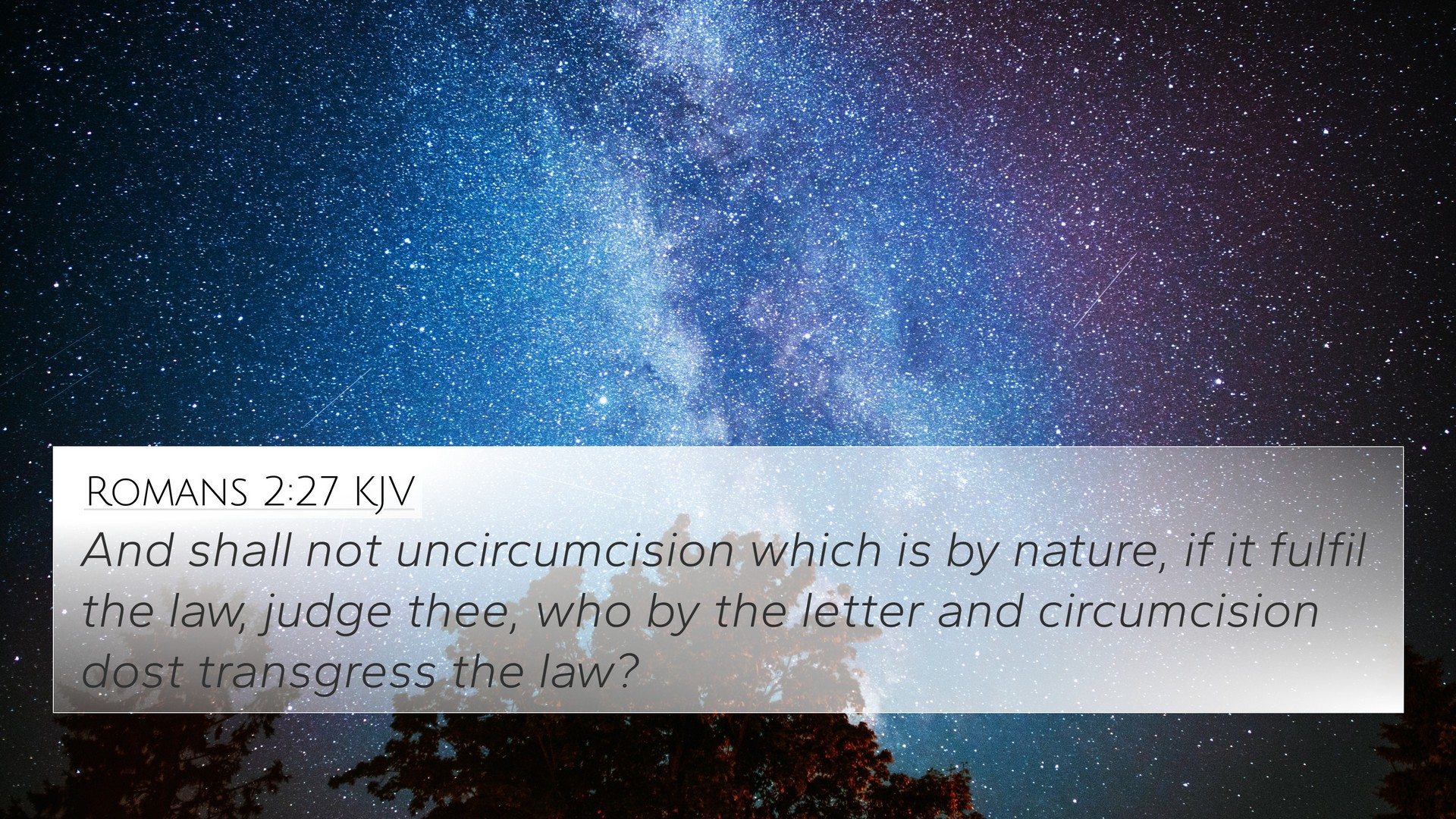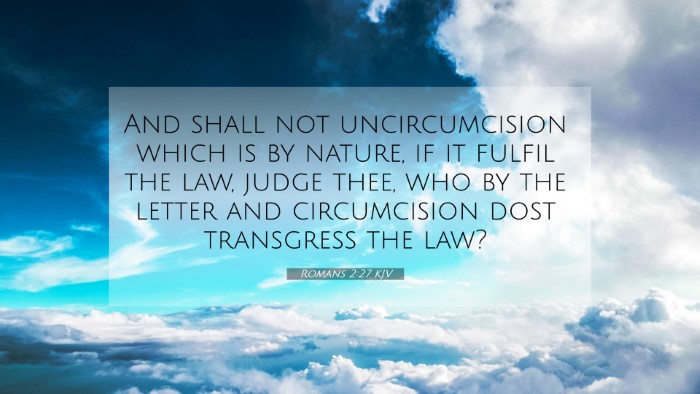Understanding Romans 2:27
Romans 2:27 states, "And shall not uncircumcision which is by nature, if it fulfill the law, judge thee, who by the letter and circumcision dost transgress the law." This verse highlights the theme of true obedience to God's law, contrasting the privileges of the Jewish people with the moral and spiritual accountability that applies to all people regardless of their heritage.
The essence of this passage lies in the idea that outward signs of religion, such as circumcision, do not guarantee righteousness. Those who are not of the physical lineage of Israel but live in accordance with God’s mandates are, in fact, fulfilling the law in a way that judges those who rely solely on their heritage and outward observance.
Commentary Insights
-
Matthew Henry:
Henry emphasizes that it is not the external that defines one's relationship with God, but the internal obedience and adherence to His laws. He suggests that the true Jew is one who is inwardly transformed, highlighting a personal connection with God that transcends cultural identity.
-
Albert Barnes:
Barnes points out that the law is fulfilled not by mere observance but by the intention and spirit behind it. He argues that Gentiles, who do not possess the law as the Jews do, can still be law-abiding through their innate understanding of right and wrong, which serves to judge those who have the law yet fail to observe it spiritually.
-
Adam Clarke:
Clarke remarks on the idea that moral conduct, inspired by faith, carries more weight than ritualistic practices. He emphasizes that God's judgment will be based on the true compliance with His will rather than on adherence to traditions that lack genuine faith.
Key Themes and Connections
This verse invites readers to explore the connections between various themes within the Bible. Here are some key points of reference:
- The Essence of Obedience: The concept of genuine obedience over ritual is prevalent in both the Old and New Testaments. Verses such as 1 Samuel 15:22 and Matthew 5:20 reinforce this notion.
- Judgment and Accountability: The idea that all individuals will be judged based on their actions and faithfulness can be seen in Romans 14:10 and 2 Corinthians 5:10.
- Faith of the Gentiles: References to the righteousness of Gentiles fulfilling the law can be connected to Matthew 8:10 and Luke 7:9, where Jesus acknowledges faith outside the Jewish tradition.
- Heart Matters: The importance of the heart in faith and lawkeeping is discussed in Deuteronomy 10:16 and Jeremiah 4:4.
- New Covenant Understanding: The transition to a new understanding of God’s law as extended to all through Jesus Christ is a critical theme in Galatians 3:28 and Ephesians 2:14-16.
- Righteousness Through Faith: This idea connects to Habakkuk 2:4 and is reiterated in Romans 1:17, emphasizing that righteousness comes through faith, not merely through status.
- The Role of the Law: Hebrews 10:1-4 provides insights into the purpose of the law and sacrifices and how they point towards the necessity of a true relationship with God.
Practical Applications
In examining Romans 2:27, we can draw several practical applications for our faith journey:
- Personal Reflection: Evaluate your own faith expression. Are we merely performing religious duties, or are we deeply connected to God’s will?
- Cross-Referencing for Depth: Utilize tools for Bible cross-referencing to enrich your understanding of Scripture. Connecting verses can unveil deeper meanings.
- Encouragement for All Believers: Understanding that the grace of God extends beyond cultural boundaries encourages inclusivity within Christian communities.
- Living Out Faith: Strive to embody the principles of love, justice, and mercy as reflective of true faith, as noted in Micah 6:8.
Conclusion
Romans 2:27 serves as a powerful reminder that outward identifiers of faith do not substitute for genuine, heartfelt obedience to God's law. Through cross-referencing and drawing connections with other scriptural texts, believers can cultivate a deeper understanding of this concept, leading to a more authentic faith lived out in their everyday lives.















